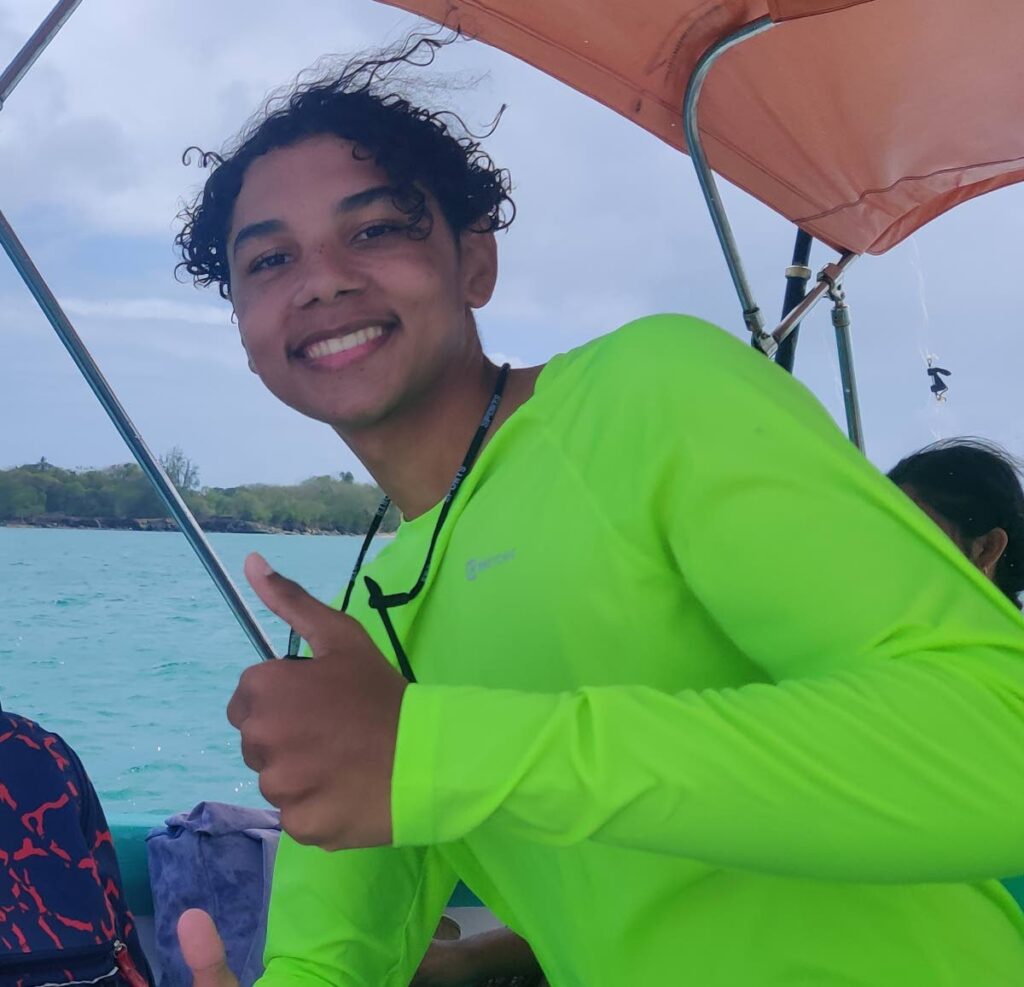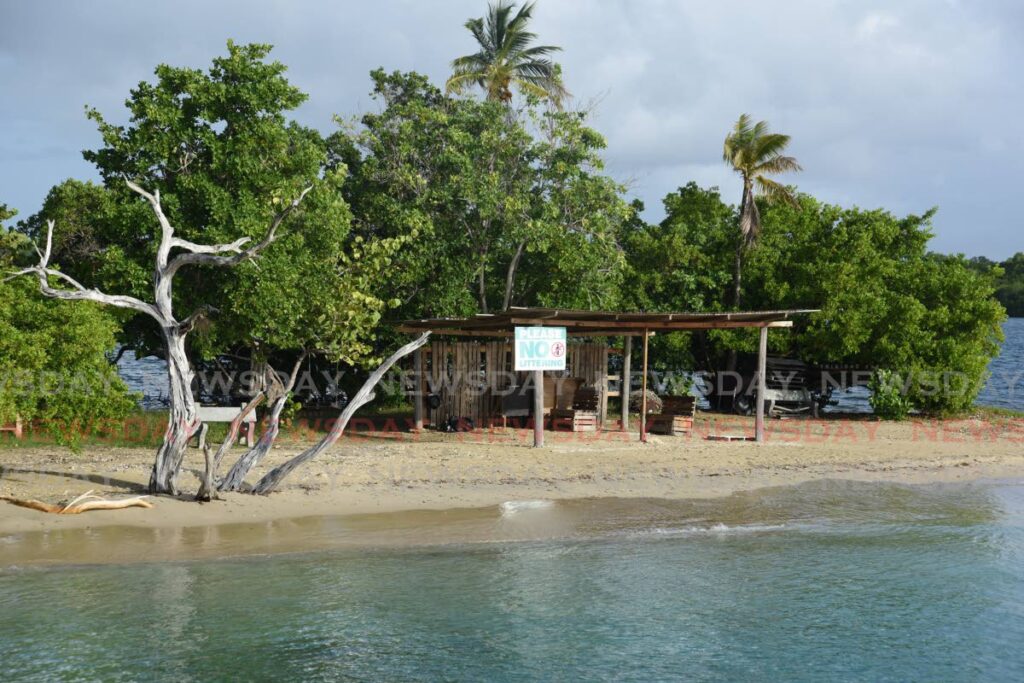15-year-old hero saves doctor from drowning in Tobago

It was April 7, the second day of their Tobago vacation, and, apart from a man grilling food, a woman selling chow and two policemen having lunch, Ricardo Laban and his entourage of 11 (his three sisters, his brother-in-law, their children, and a friend) were the only people at No Man’s Land, enjoying the peaceful spot.
They nearly did not make it to their destination; the boat hired to get them there had never turned up.
Frustrated and fussy in the hot sun, the younger children complained about wanting to get back to the hotel – but as they were about to leave, his brother-in-law, Gregg Mannette, decided they should still make the effort to find someone to take them. Coincidentally, the boatman they phoned was mere feet away, and ferried them there.
Two hours later, at about 1.30 pm, two party boats pulled into the calm waters, with music blasting and passengers in full vacation and party mode, which disrupted the family’s idyllic day.
From his vantage point on his nephew’s paddle board, about 60 feet out in the water, Ricardo was vigilant, watching over his two young daughters playing closer to shore.
Shortly after the party-boat passengers had disembarked to lime, eat and drink, Ricardo saw a man less than ten feet away from one party boat, arms flailing as he quickly sank underwater, unnoticed by the revellers and boat drivers.
“I saw one man move five feet towards him when he went under, but he quickly turned and went back,” Ricardo explained. “When I realised that no one was going to save him and that I also didn’t want the children to see anyone drowning, I called out to Alex.”
Thankfully, Alex, his 15-year-old nephew, Gregg Alejandro Mannette, who was closer to shore, heard his uncle above the loud music and wind and saw him point to the flailing arms.
“My brother motioned to him in a split second and Alex responded,” Alex’s mother, Narisha, told me as the small family and I sat chatting at Crown Point Hotel a few days later. “Trust and faith. My brother knew Alex could do it, and Alex trusted him in that moment, because normally they are so close and the trust is there already.”
Alex said, “I had my focus on one thing and one thing only. I had no time to think.
“If it was not me, who would it have been? People were looking on, but no one acted.”
Diving into action, Alex swam what he described as “20 metres in less than ten seconds."
“One second more and that would have been it,” one boat driver who had observed it all said after.
By the time Alex reached the man, only his wrists were visible above the water. Alex described the unstable white coral-sand floor of No Man’s Land as having an unexpected drop and the victim, a non-swimmer, had taken a step from four- into eight-foot-deep water.
“After that Thursday I never went into the water again without my life jacket,” Alex said of the lightweight jacket he had fortunately been wearing at the time. It was the buoyancy of that safety apparel (which he wears when he sails every Saturday) that helped keep him near the surface while he bore the weight of the man, who was panicking and sinking.
Alex had never been athletic as a child, but after SEA, when he was accepted into St Mary’s College, he chose to start water polo as an extra-curricular activity. He fell in love with it – so much so that his parents made the sacrifice of moving from Arima, their lifelong hometown, to Cascade, to be closer to St Anthony’s pool, where Alex (who qualified in 2020 for the National Under-14 water polo team and hopes to participate this year with the National Under-16 team) could practise daily under “one of the best coaches in the Caribbean” – Alan Too-A-Foo.

“In water polo we are trained to react,” Alex explained. “And sometimes we have to play while people are on our backs.”
All of this, combined with basic life-saving skills he had acquired at the age of 11, empowered Alex to act with swift efficiency. Putting the man’s head on his chest, he swam backwards to the shore, where the man’s daughter and wife were waiting.
His wife, who had been shouting for help to no avail, was eternally grateful to Alex, the only one in the crowd to take any action.
“The pandemic has detached a lot of people,” Alex’s mother theorised about the inaction. “Many people now feel, ‘Let me stay in my own crease.’”
It is possible that many in the crowd were also not able to swim – a paradox, for one tends to believe that people living on an island can swim like fish.
Having been underwater for about 20 seconds, the man, a doctor, had swallowed a lot of water. Back on shore, when he was sufficiently recovered to be moved, he was put on one of the party boats and taken for medical attention.
The Trinidad-based doctor told me a few days later by phone. “If that boy had not been there, things would have been different. I was in ICU on a ventilator overnight. My lungs were full of water.
“What he did gave me a second life. One minute makes a lot of difference. Life and death.
"The others there were grown-up people, staring at me, doing nothing…but this one boy came to me. He responded to the moment.
“What was sad for me was that my wife said she was shouting and no one seemed bothered, as if to say, ‘Why should I go and rescue him?’ I was also not happy that the boat crew did not provide lifejackets for the passengers. I asked for one for my little daughter, but if I had not, he would not have given me.
“I am so thankful to that boy. There are no words to describe him. My wife said he was a kid. How can a kid pull me out of water? I am a big man.”
One of Alex’s family’s main reasons for going to Tobago was to enjoy what is of utmost importance to their existence: quality bonding time. Theirs is a close-knit family, the kind that prays together, stays together and lives as a unified extended entity, supporting each other and helping to raise each other’s children to be good people, by setting wholesome examples and instilling in them strong family values, spiritual awareness and humanitarian virtues.
Every morning as they drive together to school and work, Alex, his mother and father pray together, starting with the Our Father, followed by Hail Mary and then, aloud, personal prayers based on specific or general goals, intentions and requests.
On the day they were leaving for Tobago, Alex prayed for a good trip and for protection for them, for their home, car, rescue cat (Mimi), and whoever else would need it. Little did he know how applicable his simple prayer was going to be.
His mother, who describes Alex as a young person with an old soul, says their hearts were warmed and full of pride, seeing what their only child had done without thinking.
“Young people have to feel empowered to make a positive change,” she said.
Asked what he thinks has empowered him to be the humble, respectful, talented young man that he is, Alex credits his belief system and his parents, who lead by example and provide him with valuable moral tools for living a better life.
Of his future, he says, “I want to have an impact on the world and leave my mark before my time comes. I want to be of substance, to the betterment of the human race.”
He has already begun. Does he think he deserves a national award for gallantry.?
“Lifeguards do this all the time and are trained for it. For someone who is not, but who has the initiative in the circumstances…I’d consider that an act of heroism. However, it is not about if I am nominated or not; it’s about doing what is right.”
As we came to the end of our interview, Alex humbly but confidently added: “I am good at academics – a high eighties to nineties student. But if I was only focusing on academics I would miss out on other things.”
“Academics are important,” his mother interjected.
“Yes, but if I was too much into it, I might have been studying up in the hotel room while everyone else was at No Man’s Land – and I would not have been there for the doctor.
“I found it amazing that I could have saved the life of someone who has already saved so many other people’s lives.”

Comments
"15-year-old hero saves doctor from drowning in Tobago"